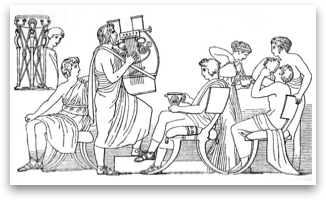
The Odyssey
Written over 2,000 years ago, there are few works of literature that are as enduring or as influential as Homer's The Odyssey. Nearly everyone can relate to both the main character's unquenchable, singular desire to return home as well as his all-too-human shortcomings and temptations.

Themes and Facts
- Likely composed near the end of the 8th century B.C.
- Written in Classical Greek.
- The main characters are Odysseus, his son Telemachus, and Odysseus' wife Penelope.
- The Odyssey focuses upon a literal journey home; however, the idea of a physical, spiritual, and psychological journey is a common motif in Western literature, which perhaps helps explain the poem's lasting influence.
- The background to The Odyssey is Homer's "other" poem, The Illiad, which addresses the fall of Troy. Major characters in The Illiad (such as Agamemnon and Achilles) are also present in The Odyssey.
- The time frame of Odysseus' leaving home to his return is 20 years.
Study Questions
- What growth do you see in Telemachus? Odysseus?
- What does the treatment of women in The Odyssey tell us about this culture's values?
- What are Odysseus' strengths? Weaknesses?
- What differences do you notice in the narrative style of The Odyssey and, say, the author(s) of the book of Genesis?
- How would you describe the temperament and behavior of the gods in The Odyssey? What differences do you see between them and, say, the God of the Hebrews?
- What types of deception do you see here? Why is such continued deception necessary?
- The ending of the poem is noted for its violence. Is such violence "extreme"? Why would such a purgation be necessary?
For all his faults, the main character in The Odyssey, "long-suffering" Odysseus, is a model epic hero who typifies not only physical prowess, but cunning, capable leadership, and devotion to his family and colleagues.
Helpful Links
- Study Questions on The Odyssey, Al Davis
- Notes on The Odyssey. Michael Webster
- Comparison of The Odyssey with Biblical narrative (Genesis 22)
- Study Guide for The Odyssey, Robin Mitchell-Boyask (highly recommended)
- Epic Conventions (very important)
- Interactive Map of Odysseus's Journey
- The Timeline of The Odyssey
- Multimedia Timeline of The Odyssey
- A Mobile-Friendly First Person Account of The Odyssey
- 40 Day Chronological Presentation of The Odyssey